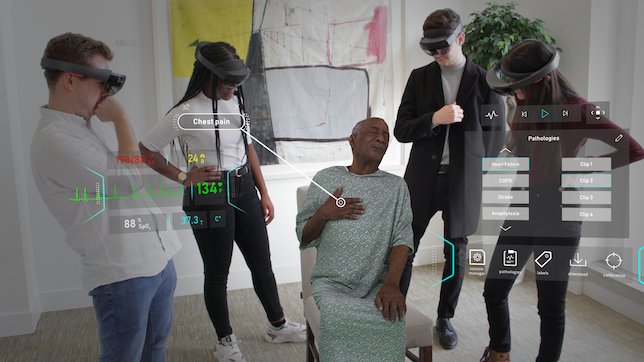University of Cambridge, Cambridge Hospitals Partner with GigXR to Co-Create Holographic Simulation Medical Training
- By Kristal Kuykendall
- 01/06/22
GigXR, a global provider of extended reality (XR) solutions for instructor-led teaching and training, has partnered with the University of Cambridge and Cambridge University Hospitals NHS Foundation Trust to co-create holographic acute-care simulations for training medical professionals at every level, according to a news release.
Using mixed reality — merging physical environments with hyper-realistic digital elements — learners will be able to interact with holographic patients to practice making high-level treatment and intervention decisions in real time. Through GigXR’s Immersive Learning Platform, the new holographic simulations also aim to give every learner unfettered access to safe-to-fail simulation scenarios while they are guided by top experts in medicine and healthcare education.

“Simulating real-world, real-time medical care requires interactive, responsive patients, medical tools and evolving scenarios that conventional methods, such as manikins, task trainers and standardized patients, and even virtual and augmented realities, cannot accurately recreate,” said Arun Gupta, Director of Postgraduate Education, Cambridge University Health Partners. “Mixed reality not only allows us to create patient holograms that will have realistic medical responses to interventions, it also merges the latest advancements in hardware devices, software, remote capabilities and expertise, to scale access to cutting-edge medical knowledge and training tools.”
Instructors will be able to access and share simulation scenarios, change patient vitals, introduce complications, and record observations and discussions, all while projecting the holographic media using a mixed-reality headset into a real-life classroom, teaching hospital, or remote individual study. Learners can participate in the holographic patient simulations using either a mixed-reality headset or a smartphone or tablet.
“Conventional simulations are heavily resource-dependent, which makes it difficult to create a global standard of medical training,” Gupta said in the news release. “By partnering with GigXR, we’re empowering instructors and institutions to usher in a new era of simulation that facilitates the seamless exchange of global medical knowledge using future-proof technology that transforms those insights from theory to true-to-life practice.”
The simulations will include scenarios across multiple pathologies, such as anaphylactic shock, acute asthma, acute pulmonary embolism and community acquired pneumonia, so that learners can master evolving situations and reinforce acute-care skills.
The holographic simulations will create a more realistic medical simulation that’s not possible when an actor portraying a patient isn’t really ill, which means diagnostic tools can’t actually be useful during simulations. With the new GigXR-Cambridge holographic simulations, learners can grab a holographic stethoscope and listen to the holographic patient’s lungs to assess and treat clinical conditions like COPD or pneumonia, according to the news release.
As the holographic simulations are launched under the new partnership, University of Cambridge also will be crafting research benchmarks and criteria for evaluating learning and patient outcomes with mixed-reality devices, as well as evaluating the products and resulting efficiencies for the institution. The research will guide future development, GigXR said, so that the holographic simulations will come to market optimized and supported by academic insights.
GigXR, the University of Cambridge and Cambridge University Hospitals NHS Trust plan to launch the holographic simulations in mid-2022. Los Angeles-based GigXR is a provider of extended-reality learning systems for medical and nursing schools, hospitals, higher education, and the Department of Defense.
About the Author
Kristal Kuykendall is editor, 1105 Media Education Group. She can
be reached at [email protected].